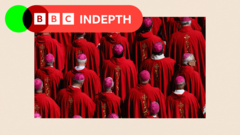Despite a growing consensus on the importance of building upon Francis' work—particularly regarding social justice, migration, and environmental issues—critics within the Church remain concerned about the direction the new pope should take. This nuanced landscape of expectation highlights the pressing need for unity while addressing various global challenges, including dwindling congregations in Europe versus significant poverty issues in Africa and Asia. The next pope will not only serve as a spiritual figure but will also need to act as a diplomat on the world stage, navigating complex global dynamics and maintaining the Church's relevance in an evolving landscape.
The Vatican’s upcoming conclave signifies a critical juncture for the Catholic Church as it seeks to balance tradition with progressive change, ensuring that the voice of the marginalized continues to resonate in its future mission.
As the cardinals prepare to enter the Sistine Chapel for the vote, they will be called upon to seek divine guidance amid the crucial decisions they will face, reflecting not just on the legacy of their predecessor but on the broader spiritual and administrative needs of the Church today.
The Vatican’s upcoming conclave signifies a critical juncture for the Catholic Church as it seeks to balance tradition with progressive change, ensuring that the voice of the marginalized continues to resonate in its future mission.
As the cardinals prepare to enter the Sistine Chapel for the vote, they will be called upon to seek divine guidance amid the crucial decisions they will face, reflecting not just on the legacy of their predecessor but on the broader spiritual and administrative needs of the Church today.




















